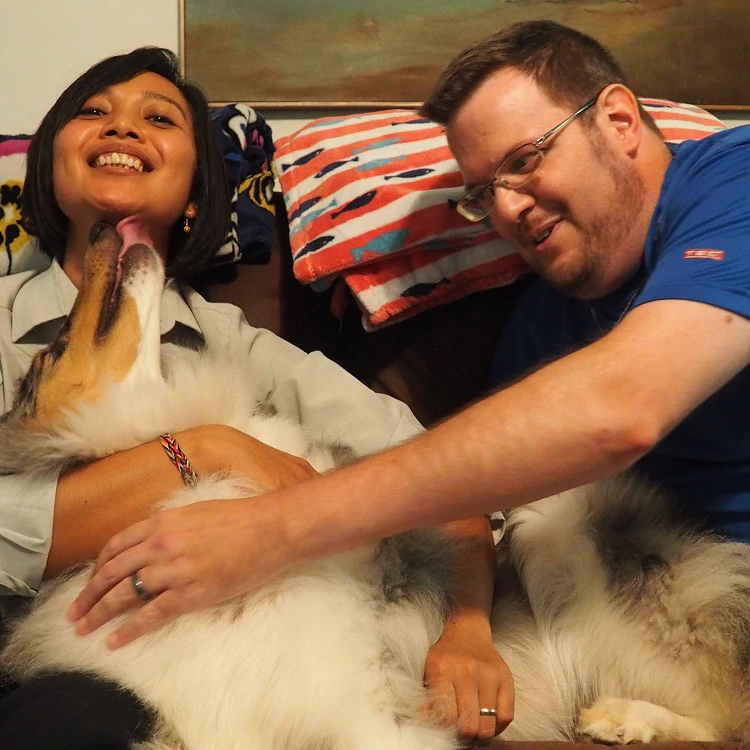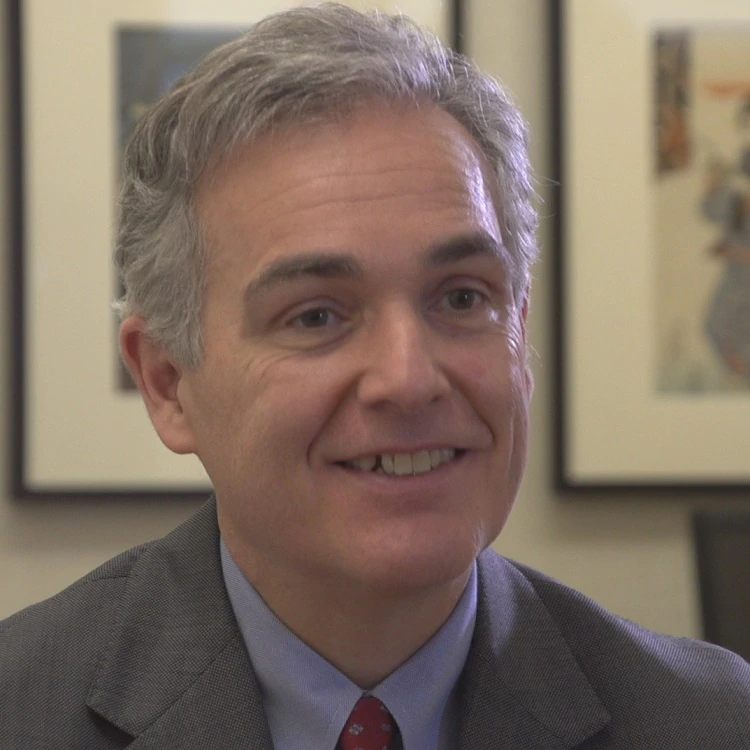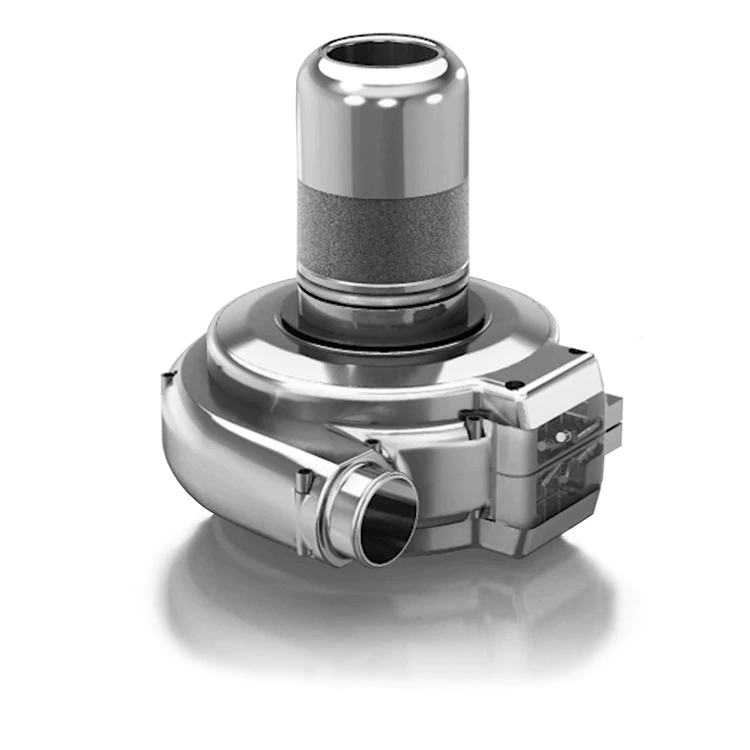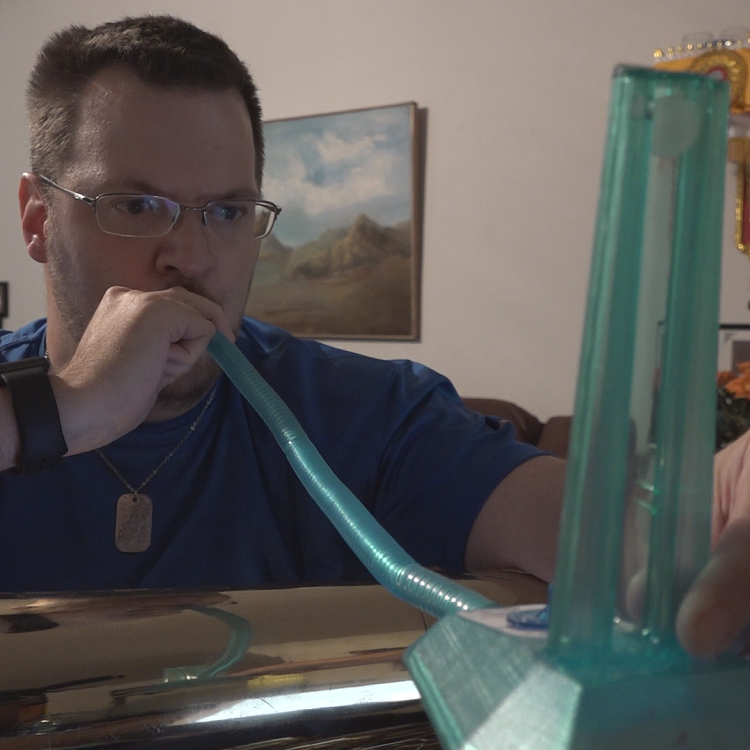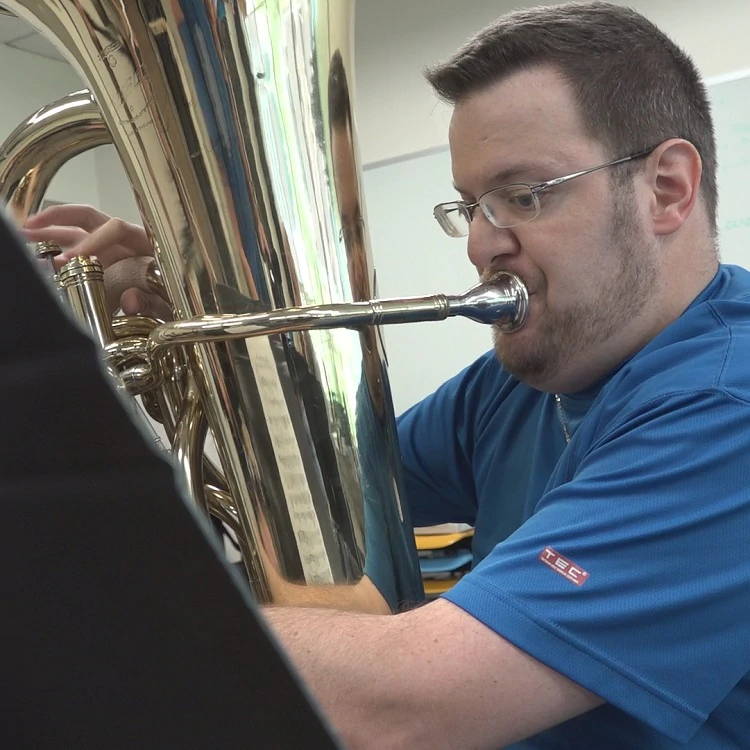Looking Forward To Life's Sweet Music
FDA approves HeartWare™ HVAD™ System as a ‘destination therapy’ for patients with severe heart failure.
Bluegrass isn’t the only music in the air around Sylva, North Carolina.
In this small community at the edge of the Great Smoky Mountains, Rob Johnson and his bandmates prefer classical tunes.
“I’ve played the tuba ever since the seventh grade,” Johnson said.
Talented enough to consider a career in orchestra, Johnson’s life hit a sour note in his early 20s. Diagnosed with a congenital heart problem in 2000, he underwent open heart surgery to replace a faulty aortic heart valve.
Then, in 2009, even worse news, when a nasty cough would not go away.
'I was calm about it, but I felt doomed.'
-- Rob Johnson
“I would cough so hard I would just sweat through my shirts,” he said. “It was horrifying. Nothing worked. Then one day at an appointment with my cardiologist, he said ‘I’m sorry. It’s not pneumonia. It’s heart failure.’”
In a matter of months, the pumping efficiency of Johnson’s heart plummeted to just 10 percent. Newly married and just 36 years old, he was now on oxygen and in a wheelchair. And he did not qualify for a heart transplant. His antibody levels were too high. His body would have rejected the new organ.
“I was calm about it, but I felt doomed,” he said.
Left Ventricular Assist Device
A Duke University team led by Joseph Rogers, M.D., turned to a medical device to help Johnson.
Surgeons there implanted the Medtronic HeartWare HVAD System.
In clinical trials at the time of Johnson’s surgery in 2011, the “left ventricular assist device,” or LVAD, helps the heart pump and increases the amount of blood that circulates through the body. A driveline extends out of the body to a rechargeable battery pack that powers the device.
“The change after the procedure often times is almost immediate,” said Dr. Rogers. “You walk into the room in the ICU and they've got, you know, pink faces again. We see a relatively quick physiologic recovery once we restore a normal blood flow. Roughly 80 percent of patients who receive LVADs show either no symptoms or very mild symptoms of heart failure after the procedure.”
Until recently, patients like Rob had few choices. The HVAD System was only approved for patients waiting for heart transplants, who needed a bridge until a donor heart was found.
'The change after the procedure often times is almost immediate.'
-- Joseph Rogers, M.D., Duke University
DESTINATION THERAPY
But only about 3,000 heart transplants are performed each year in the United States.
Then in September 2017, the FDA approved the Medtronic HeartWare HVAD System as a destination therapy, a permanent solution for patients like Johnson, who have severe heart failure. That approval greatly expands the number of people who have access to the therapy.
“The estimate of the number of patients eligible for destination therapy in the United States varies,” said University of Michigan cardiac surgeon Francis Pagani, M.D., Ph.D., who co-led clinical studies of the HeartWare HVAD System alongside Dr. Rogers. “Some people put the estimate as high as 300,000. Other put the number between 30,000 and 50,000. If it’s the lowest number, that’s still ten times as many people as had been eligible previously,” he said.
Dr. Pagani, who has specialized in cardiac surgery for 25 years, said he’s impressed by the advances in mechanical circulatory support technology.
“Just by the sheer size reduction alone, the Medtronic system will open up this therapy to many other patients,” he said. “And the reliability is so much better. Today the thought of people living five or even 10 years with circulatory support is not unusual at all,” he said.
'Just by sheer size reduction alone, the Medtronic system will open up this therapy to many other patients.'
-- Francis Pagani, M.D., Ph.D., University of Michigan
Rob Johnson has now had his device for six years. There was a time when he feared he would never again have enough strength to play in the yard, or enough stamina to visit his wife’s native Bali. Or enough breath to play his beloved tuba. But he’s done all of those things. And he’s looking forward to experiencing more of life’s sweet music.
“It feels great. Wonderful. During the worst of it I was barely able to get out of bed. This device has really changed the world for me.” He paused. “For sure.”
Important Safety Information: HeartWare™ HVAD™ System
Indications for Use
The HeartWare™ HVAD™ System is indicated for hemodynamic support in patients with advanced, refractory left ventricular heart failure; either as a Bridge to Cardiac Transplantation (BTT), myocardial recovery, or as Destination Therapy (DT) in patients for whom subsequent transplantation is not planned.
Warnings/Precautions
Proper use and upkeep of the HeartWare™ HVAD™ System is important to keep the pump working well. This device may cause serious and life threatening events, including stroke. Managing your blood pressure may reduce the risk of stroke. Never remove both power sources at the same time (batteries or power adapters) since this will stop the pump, which could lead to serious injury or death. At least one power source must be connected at all times. Always keep a spare controller and fully charged spare batteries available at all times in case of an emergency. Do not disconnect the driveline from the controller or the pump will stop. Avoid kinking or twisting your driveline. Avoid devices and conditions that may induce strong static discharges as this may cause the VAD to fail to work normally or stop. Magnetic resonance imaging (MRI) should not be used, as it could cause severe harm to you and the pump.
Potential complications
Implantation of a VAD requires major surgery. There are many risks associated with the surgical procedure as well as after the HVAD has been implanted. These known risks include, but are not limited to, death, stroke, device malfunction, blood clots, bleeding, other types of heart failure, infection, red blood cell destruction, and total body infection.
See the HeartWare HVAD System Patient Manual for detailed information regarding instructions on operating the HeartWare HVAD System and on necessary medical care. If you have any questions after reading the manual, please ask your clinician.
Caution: Federal law (USA) restricts these devices to sale by or on the order of a physician.
